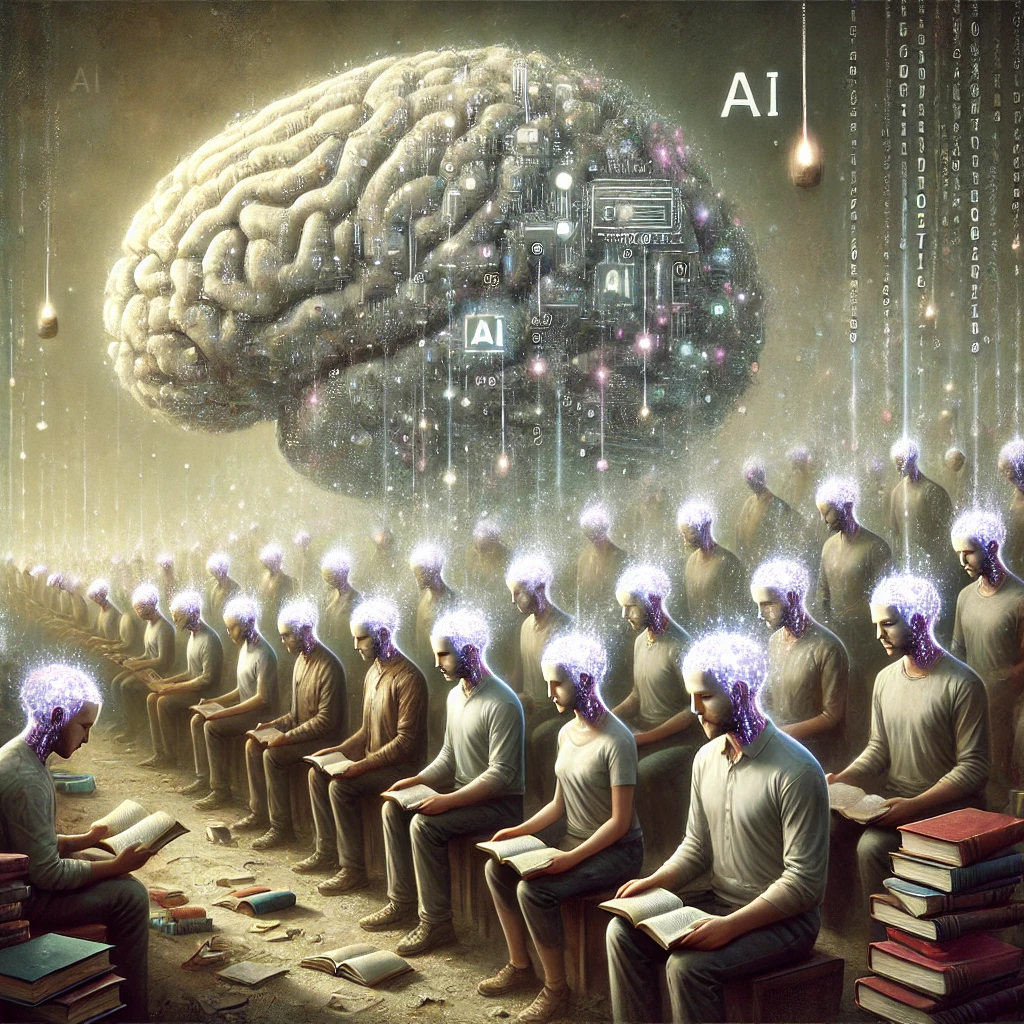
It begins with a quiet surrender. A question forms—urgent, demanding—and the answer is close enough to feel like an extension of your own mind. A swipe, a tap, and the question dissolves, replaced by the answer, now claimed by your memory as if it had always been there. But what is lost in this exchange?
The 2025 study AI Tools in Society: Impacts on Cognitive Offloading and the Future of Critical Thinking turns its lens toward this unsettling transformation. It examines the silent trade-off humanity has made: handing over the labour of memory and reasoning to artificial intelligence, unknowingly trading a sliver of what makes us human in return for convenience. The study reveals a stark correlation: those who depend most heavily on AI tools for cognitive tasks are losing their grip on critical thinking skills.
To understand this surrender, the researchers gathered data from 666 individuals—young and old, educated and less so. Numbers were crunched into patterns, voices transformed into narratives, and the findings spoke plainly. Those who leaned heavily on AI tools found themselves faltering in the realm of critical thought. Their problem-solving weakened, their decision-making dulled. The young, those born into a world of ceaseless connectivity, were most vulnerable. Their reliance on AI robbed them of a skill they had scarcely been taught to value.
Yet, amid this bleak horizon, education emerged as a shield. The study revealed that those who had engaged deeply with learning, who had wrestled with ideas and emerged stronger, retained their critical thinking skills, no matter how much they used AI. Knowledge, it seems, offers a resistance to the numbing touch of the machine.
The implications are stark. To allow AI to carry too much of our mental weight is to risk losing the ability to carry it ourselves. Schools and policymakers must act, instilling in future generations not just the ability to use these tools but the wisdom to question them. In this age of artificial minds, the human mind must not be allowed to atrophy. It is a reminder, a warning, a plea: think while you still can, for the machines will not think for you.
This is not the first warning. Fourteen years ago, Betsy Sparrow’s 2011 paper, Google Effects on Memory: Cognitive Consequences of Having Information at Our Fingertips, sounded an alarm. Sparrow identified the "Google effect"—a phenomenon where the Internet became humanity’s external hard drive, a transactive memory system. People no longer needed to remember information; they needed only to remember how to find it.
Where Sparrow Began, We Now Stand
Sparrow’s research foreshadowed the reality we inhabit today, where the line between human thought and machine memory has blurred. Sparrow’s participants remembered where to locate information, not the information itself. The new study finds a progression of this trend: with AI, it is no longer even necessary to remember where to find answers. AI anticipates the need and delivers solutions before the question has fully formed in the mind.
Yet, there is a difference between Sparrow’s Internet-dependent world and the AI-driven ecosystem of today. Sparrow’s findings were rooted in access; modern AI introduces automation. In Sparrow’s time, people searched and selected; now, they are served. The cognitive exercise of sorting through search results, of assessing credibility and context, has been replaced by the passive acceptance of AI-generated conclusions.
A Future Unwritten, Yet Precariously Drafted
The implications for society are as vast as they are alarming. Critical thinking—the ability to analyse, question, and solve—becomes brittle when not exercised. Education, already strained by the digital transformation, now faces an even steeper climb. Students, growing up in an AI-rich environment, risk becoming dependent on tools that supply answers without teaching the reasoning behind them.
In decision-making, the stakes rise higher. If we grow accustomed to outsourcing our thinking, what happens when AI falters? What happens when it is manipulated or simply fails to account for the nuances of human morality, culture, or intention? The very infrastructure of problem-solving could crumble, leaving us defenceless in the face of complex crises.
Fighting the Fade: Mitigating Risks and Reclaiming Thought
Mitigation is possible, but it requires an intentional reinvention of how we approach education, technology, and ourselves.
Reimagine Education: Schools must prioritize the teaching of metacognition—thinking about thinking—and integrate curricula that challenge students to reason, debate, and solve problems independently.
Mindful Technology Use: We must cultivate awareness of how and when we rely on AI, training ourselves to treat it as a collaborator rather than a crutch.
Balanced AI Design: Technologists have a responsibility to create systems that enhance human cognition rather than supplant it. Transparency and user agency must be baked into AI design.
Public Discourse: As a society, we need open conversations about the ethics of cognitive offloading, ensuring that humanity remains in control of its intellectual future.
What Lies Ahead
Humanity is at a crossroads. Will we succumb to the allure of frictionless thought, or will we rise to meet the challenge of preserving our cognitive independence? The future is not yet written, but if we are to retain the essence of who we are, it will require a conscious, collective effort.
As Sparrow observed in 2011 and as this study confirms today, the path of least resistance is rarely the path that leads to growth. To survive—and thrive—we must resist the quiet surrender.
Want to learn more? My sources are your sources (except for the confidential ones).
"AI Tools in Society: Impacts on Cognitive Offloading and the Future of Critical Thinking. (2025), "Google Effects on Memory: Cognitive Consequences of Having Information at Our Fingertips. 2011 and Study Finds That Memory Works Differently in the Age of Google
